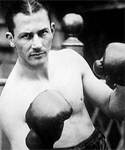Benjamin Leiner
(1896 - 1947)

When Benjamin Leiner, the son of Russian Jewish immigrants, was growing up in New York’s Greenwich Village prior to World War I, he and his friends fought against Irish, Italian and other immigrant youth gangs for a "place" in the neighborhood. As he later recalled, "In the winter we fought with snowballs packed tightly around pieces of coal and soaked with water until they were hard as cannon balls. Then we used baseball bats, stones and loaded canes. . . . There was many a boy who suffered permanent injury from an encounter with the warriors from the next block."
After losing one of these street fights, Leiner’s uncle took him for boxing lessons. According to historian Peter Levine, the slender young Leiner became the undisputed champion of his block. Soon, he was fighting for prize money at local gyms.
Leiner’s mother deeply opposed his fighting, which she considered dangerous and unseemly for an Orthodox Jewish boy. To "protect" her feelings, Leiner began fighting under the name Benny Leonard, but could not keep his secret for long. He returned home from a fight with a black eye and, when confronted, Benny admitted that he was hurt in the ring. Then, he put his $20 winnings on the kitchen table. "My mother," he later said, "looked at my black eye and wept. My father, who had to work all week for $20, said, ‘All right Benny, keep on fighting. It’s worth getting a black eye for $20; I am getting verschwartzt [blackened] for $20 a week.’"
This anecdote tells much about the role boxing played in he assimilation of Eastern European Jewish immigrants and their children into the American mainstream. For successful fighters like Leonard, it offered a chance to escape from the low wages of sweatshops and factories. By 1916, Benny was so adept at boxing that he could afford to move his parents to a larger home in Harlem, where he continued to live.
Leonard kept fighting and in 1917, won the lightweight championship of the world. That night, his immigrant Jewish followers proudly marched through the streets of Harlem waving American flags. Leonard held the title for 8 long years, despite the fact that the lightweight division was probably the most competitive in boxing. Known as "the Great Bennah," Leonard was so skillful that he could boast of going through fights without his opponent mussing his hair. Sportswriter Al Lurie wrote of Leonard that, when he was the champ, he was "the most famous Jew in America . . . beloved by thin-faced little Jewish boys who, in their poverty, dreamed of themselves as champions of the world."
One of those little boys was Budd Schulberg, who later became famous as a novelist and screenwriter. Schulberg noted of Leonard, "To see him climb in the ring sporting the six-pointed star on his fighting trunks was to anticipate sweet revenge for all the bloody noses, split lips and mocking laughter at pale little Jewish boys who had run the neighborhood gauntlet."
Leonard’s reign as champion was about more than revenge, however; it also conveyed respect and recognition. In a burst of hyperbole, the New Warheit compared Leonard to Albert Einstein and concluded that the boxer "is perhaps even greater than Einstein, for when Einstein was in America only thousands knew him but Benny is known by millions. It is said that only twelve people or at the most twelve times twelve the world over understand Einstein, but Benny is understood by tens of millions in America." The paper drew a Zionist conclusion: "Just as we need a country so as to be the equal of other people, so we must have fists to become their peers."
Ever mindful of his mother’s concern for his safety, Leonard retired in 1925. "My love for her," he told the press, "is greater than my love for the game that has made me independently wealthy, and to which I owe all I now possess." Unfortunately, the stock market crash of 1929 wiped out Leonard’s wealth. By 1930, Benny returned to the ring to recoup his fortunes.
Sadly, age and inactivity had taken its toll on Leonard. After a series of tune up fights against weaker opponents, Leonard was matched against a tough Irish boxer, Jimmy McClarnin. "There is scarcely a Jew whose blood runs red," the sportswriter for the Los Angeles B’nai B’rith Messenger wrote, "who is not vitally interested in the outcome. . . Win, lose or draw, this compatriot of mine will have shown the world that he was a true fighting man."
McClarnin knocked out Leonard in 6 rounds, the first time Leonard lost by a KO. He retired again and assumed a career in vaudeville and as a boxing referee. In 1947, while refereeing a fight, he died in the ring of a heart attack. Al Lurie mourned Leonard with the following words:
When a people is beaten, persecuted and frustrated, it finds more than mere solace in its champions . . . When Leonard was accepted and admired by the entire fair-minded American community, the Jews of America felt they, themselves, were being accepted and admired. Leonard, therefore, symbolized all Jewry.
Since Leonard’s time, Jews have earned America’s admiration in fields such as science, business and politics. Like other immigrants groups, however, Jews had to fight their way into respectable society. Benny Leonard did his fighting in the ring, on behalf of an entire generation.


